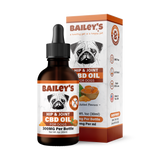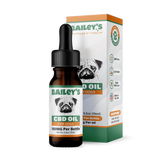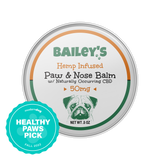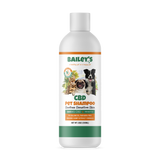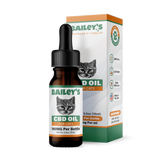Broccoli and Cats: Feline-Friendly Greens?
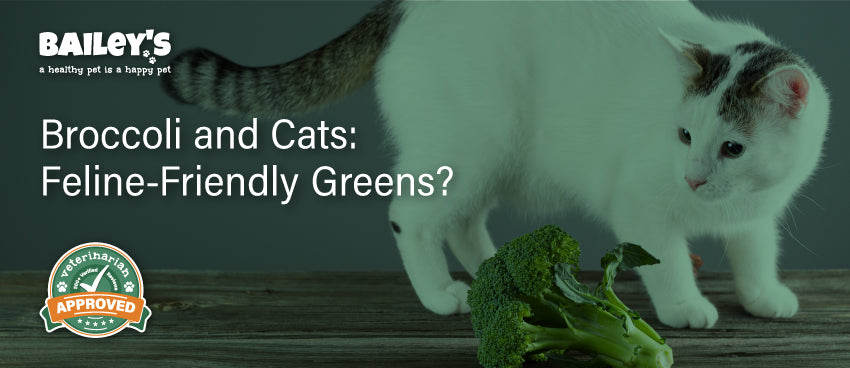
Cats are notorious for their selective eating habits, and as responsible pet owners, it's only natural to question whether certain foods are suitable for our feline friends. One food that often sparks curiosity is broccoli, a vegetable known for its nutritional value in human diets.

In this article, the fine folks at Bailey’s CBD dive into the topic of cats and broccoli, exploring their nutritional needs, potential benefits and risks, and how to safely incorporate vegetables into their diet.
Table of Contents
1. Understanding Feline Nutrition
Before we can determine if broccoli is a suitable food for cats, it's essential to understand their nutritional requirements. Cats are obligate carnivores, meaning their bodies are designed to thrive on a meat-based diet. Protein, specifically animal protein, is crucial for their growth, energy, and overall well-being. However, cats also require certain nutrients that can be found in plant-based foods.
When it comes to feline nutrition, it's important to consider the balance of essential nutrients. While cats rely primarily on animal protein, they also need specific nutrients found in vegetables to support their overall health. These include vitamins, minerals, and dietary fiber. Incorporating a small amount of vegetables into their diet can help ensure they receive these essential nutrients.
1.1 Essential Nutrients for Cats
Protein is the foundation of a cat's diet, but it's not the only nutrient they need. Cats require a variety of essential nutrients to thrive. These include vitamins, minerals, and fatty acids. Vitamins such as vitamin A, vitamin C, and vitamin K play important roles in maintaining a cat's immune system, vision, and blood clotting abilities. Minerals like potassium and magnesium are necessary for proper muscle function, nerve transmission, and bone health. Additionally, dietary fiber aids in digestion and promotes healthy bowel movements.
1.2 The Role of Vegetables in a Cat's Diet
While cats are primarily carnivorous, incorporating a small amount of vegetables into their diet can provide them with additional nutrients. Vegetables offer cats a source of vitamins and minerals that are essential for their overall well-being. For example, vitamin A is crucial for maintaining healthy skin and coat, while vitamin C acts as an antioxidant and supports the immune system. Vitamin K plays a vital role in blood clotting, which is important for wound healing.
In addition to vitamins, vegetables also provide minerals that cats need. Potassium is essential for maintaining proper hydration and electrolyte balance, while magnesium is necessary for muscle function and energy production. The fiber found in vegetables can aid in digestion by promoting regular bowel movements and preventing constipation.
However, it's important to note that vegetables should not make up a significant portion of a cat's diet. While they can provide additional nutrients, cats still require a primarily meat-based diet to meet their unique nutritional needs as obligate carnivores. It's always best to consult with a veterinarian before making any significant changes to your cat's diet.
2. The Controversy: Can Cats Eat Broccoli?
Now, let's address the question on every pet owner's mind – can cats eat broccoli? While some cat owners may have heard conflicting opinions on this matter, the consensus among veterinarians is that it is generally safe for cats to consume small amounts of broccoli. However, there are a few important factors to consider.
2.1 Debunking Myths About Cats and Broccoli
Firstly, it's crucial to clarify that broccoli itself is not toxic to cats. Contrary to popular belief, broccoli does not contain any substances that are directly harmful to felines. However, this does not mean that it is the ideal vegetable for their diet. Cats have specific dietary needs that are best met through animal-based protein sources.
When it comes to the debate of whether cats can eat broccoli, it's important to separate fact from fiction. Many cat owners have heard the myth that broccoli can cause kidney problems in cats. However, there is no scientific evidence to support this claim. Broccoli contains important vitamins and minerals that can be beneficial to a cat's overall health.
It's also worth noting that while cats are obligate carnivores, meaning they require a diet primarily consisting of meat, they do have the ability to digest and derive some nutrients from plant matter. This is why you may occasionally see your cat nibbling on grass or other greens. However, it's important to remember that plant matter should only make up a small portion of their diet.
2.2 Potential Health Benefits and Risks
While broccoli does not offer cats any unique health benefits, it can be a source of important nutrients when given in moderation. Some cat owners have reported that their feline companions enjoy the taste and texture of broccoli, while others have noticed positive effects on their cat's coat and overall vitality.
Broccoli is rich in vitamins A, C, and K, as well as fiber. These nutrients can support a cat's immune system, promote healthy digestion, and contribute to a shiny coat. However, it's important to remember that cats have different nutritional requirements compared to humans, and their bodies may not absorb these nutrients from broccoli as efficiently.
However, it's important to exercise caution when introducing broccoli to your cat's diet. As with any new food, some cats may experience digestive upset, such as diarrhea or vomiting, when first introduced to broccoli. Always monitor your cat's reaction and consult with your veterinarian if you have any concerns.
Additionally, it's important to note that not all cats will enjoy the taste of broccoli. Just like humans, cats have individual preferences when it comes to food. If your cat shows no interest in broccoli or refuses to eat it, do not force them to consume it. There are plenty of other nutritious foods that can be incorporated into their diet.
While cats can eat broccoli in small amounts, it should not be a staple in their diet. It's always best to consult with your veterinarian before introducing any new foods to your cat, especially if they have any underlying health conditions or dietary restrictions. Remember to monitor your cat's reaction and adjust their diet accordingly.
3. How to Safely Introduce Broccoli to Your Cat's Diet
If you decide to provide your cat with a small amount of broccoli, it's crucial to take the necessary steps to ensure their safety and well-being.
Broccoli, a nutrient-rich vegetable, can be a healthy addition to your cat's diet when introduced properly. However, it's important to remember that cats are obligate carnivores, meaning their bodies are designed to thrive on a meat-based diet. While broccoli can offer some benefits, it should only be given in moderation and as a supplement to their primary protein source.
When incorporating broccoli into your cat's diet, it's important to prepare it properly. Begin by steaming or boiling the broccoli to soften it, making it easier for your cat to chew and digest. Avoid adding any seasonings, oils, or sauces, as these can be harmful to cats. Plain, cooked broccoli is the safest option for your feline friend.
It's worth noting that some cats may have an aversion to the taste or texture of broccoli. If your cat shows disinterest or refuses to eat it, forcing them to consume it may not be the best course of action. Respect your cat's preferences and focus on providing a well-balanced diet that meets their nutritional needs.
After introducing broccoli into your cat's diet, observe their response closely. Monitor their behavior and any changes in their digestive system. If they show signs of gastrointestinal distress, such as vomiting or diarrhea, it may be best to discontinue the use of broccoli. Every cat is unique, and while some may tolerate broccoli well, others may not find it appealing or digestible.
Remember, variety is key when it comes to feeding your cat. While broccoli can offer some nutritional benefits, it should not replace the essential nutrients found in a balanced cat food diet. Consult with your veterinarian to determine the appropriate amount of broccoli to include in your cat's diet and to ensure that their overall nutritional and supplemental needs are being met.
4. Other Vegetable Options for Cats
While broccoli can be a safe and nutritious treat for some cats, there are other vegetable options to consider.
When it comes to providing a well-rounded diet for your feline friend, incorporating a variety of vegetables can be beneficial. Not only do vegetables offer additional vitamins and fiber, but they can also add some interesting flavors and textures to your cat's meals.
4.1 Safe and Unsafe Vegetables for Cats
Some other vegetables that cats may enjoy and benefit from include cooked sweet potatoes, pumpkin, and peas. These vegetables not only provide essential nutrients but also offer a delightful taste that can pique your cat's interest.
Cooked sweet potatoes are a great source of dietary fiber, which can aid in digestion and promote a healthy gut. They are also rich in vitamins A and C, which are essential for maintaining your cat's overall well-being.
Pumpkin, on the other hand, is known for its high fiber content, which can help regulate your cat's bowel movements. It can be particularly beneficial for cats struggling with constipation or diarrhea. Additionally, pumpkin is packed with antioxidants that can support your cat's immune system.
Peas, whether served fresh or cooked, can be a tasty and nutritious addition to your cat's diet. They are a good source of vitamins K and B, as well as minerals like potassium and iron. However, it's important to note that peas should be cooked thoroughly to ensure they are easily digestible for your feline companion.
While these vegetables can provide numerous health benefits, it's crucial to remember that moderation is key. Just like with broccoli, these vegetables should only be offered in small quantities to prevent any digestive upset or nutrient imbalances.

4.2 Alternatives to Broccoli for Feline Consumption
If your cat isn't a fan of broccoli or if you're looking for variety in their diet, there are alternative options to consider. Commercially available cat foods are specifically formulated to provide complete and balanced nutrition for cats, ensuring they receive the necessary nutrients without the need for vegetables.
These cat foods often contain a blend of high-quality proteins, essential fatty acids, vitamins, and minerals that cater to your cat's specific nutritional needs. They come in various flavors and textures, allowing you to find the perfect option that your cat will love.
Additionally, if you're keen on introducing more vegetables into your cat's diet, you can explore homemade cat food recipes that incorporate a variety of safe and nutritious ingredients. However, it's important to consult with your veterinarian or a feline nutritionist to ensure that the homemade meals meet all of your cat's dietary requirements.
Remember, every cat is unique, and their dietary preferences may vary. It's essential to observe your cat's reactions to different vegetables and consult with a veterinary professional to determine the best options for their individual needs.
5. Consulting with a Vet About Your Cat's Diet
When it comes to your cat's diet, it's always best to consult with a veterinarian. They can provide personalized recommendations based on your cat's specific needs and health considerations.
5.1 When to Seek Professional Advice
If you have concerns about your cat's nutritional requirements, dietary restrictions, or are considering introducing new foods such as broccoli, schedule an appointment with your veterinarian. They will be able to assess your cat's individual needs and help you make informed decisions about their diet.
5.2 Addressing Dietary Concerns with Your Vet
Your veterinarian can address any dietary concerns you may have and provide guidance on incorporating vegetables, like broccoli, into your cat's diet. They may also recommend specific cat food brands that prioritize animal-based proteins and have added nutrients to meet your cat's nutritional needs.


